|
|
|
Sort Order |
|
|
|
Items / Page
|
|
|
|
|
|
|
| Srl | Item |
| 1 |
ID:
184050
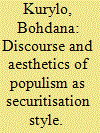

|
|
|
|
|
| Summary/Abstract |
Populists have lately been at the forefront of securitisation processes, yet little attention has been paid to the relationship between populism and securitisation. This paper investigates the role of securitisation in populism, exploring how the populist mode of securitising differs from traditional securitisation processes. It argues that securitisation is inherently embedded in populism which embodies a particular style of securitisation with a distinct set of discursive and aesthetic repertoires. The populist invocation of societal security and their claim to defend the fundamentally precarious identity of ‘the endangered people’ necessitate an unceasing construction of new threats. Aiming to discredit ‘elitist’ securitisation processes, populism invests in a specific construction of the referent object, the securitising actor and their relationship to the audience. The populist securitising style also carries a distinctive aesthetic centred on ‘poor taste’, sentimental ordinariness and unprofessionalism, examining which can widen our understanding of the aesthetics of security.
|
|
|
|
|
|
|
|
|
|
|
|
|
|
|
|
| 2 |
ID:
184047
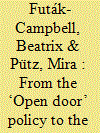

|
|
|
|
|
| Summary/Abstract |
This article explores Angela Merkel’s decision to open Germany’s borders to refugees in September 2015 and her support for the EU-Turkey statement in March 2016. While the first policy offered relief to refugees, the second was designed to significantly reduce the number of refugees coming to Europe. Besides the seemingly contradictory rationale behind these two foreign policy decisions, the role that domestic media played in Merkel’s decision to open the borders was remarkable. The connection between media reports and public opinion has long been established, whereas the connection between foreign policy and the media is more recent. However, the link between all three and how they operate together is yet to be studied. By exploring these connections, we show how foreign policy decisions can be accepted by locals within a language context that fosters identification with outsiders. Similarly, a shift in the discourse, which contributed to the perception of a divergence of interests between the local population and the refugees, helps to understand the subsequent change in foreign policy. In short, we show how this shift provides an insight into the parallels between domestic media discourses, public opinion and foreign policy decisions. We apply deductive qualitative content analysis to demonstrate this connection.
|
|
|
|
|
|
|
|
|
|
|
|
|
|
|
|
| 3 |
ID:
184044
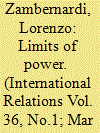

|
|
|
|
|
| Summary/Abstract |
Hans J. Morgenthau’s contribution to international relations and political theory appears to have been fully recognized to date. However, his ideas have undergone surprisingly little comprehensive investigation: an attitude that made it possible to grasp only a few aspects of his reflections. The main argument of this article is that the main area of inquiry in Morgenthau’s scholarship – international politics and foreign policy – is based on general considerations regarding the role of reason in politics and the limits of knowledge of the social universe. Not only does the question of the possibility of such knowledge lie at the root of his considerations on political action, but it also forms the mainspring of his reflection on ethics. Through an inquiry into the red thread that tightly links his diverse body of thought on social sciences, ethics, and foreign policy, the article aims to show that Morgenthau was a systematic political thinker who set out from theoretical observations on the limits of knowledge to develop particular insights into ethics and, from there, a particular notion of how foreign policy should be conducted. In other words, Morgenthau established links of essential continuity between knowledge, ethics, and action.
|
|
|
|
|
|
|
|
|
|
|
|
|
|
|
|
| 4 |
ID:
184046
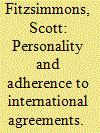

|
|
|
|
|
| Summary/Abstract |
Although Donald Trump’s foreign policy behavior is often characterized as erratic and unpredictable, he was remarkably consistent in his hostility toward international agreements. The president withdrew or threatened to withdraw the United States from several agreements and consistently characterized agreements as ‘horrible deals’ that ‘cheat’ his country. This article explores why Trump exhibited such consistent disdain for international agreements. To address this question, it develops propositions that draw a causal link between a leader’s personality traits and their willingness to challenge constraints: a leader with a relatively high belief in their ability to control events is more likely to challenge constraints than a leader with a lower belief in their ability to control events; moreover, a leader with a relatively high level of distrust of others is more likely to challenge constraints than a leader with a lower level of distrust of others. The article then conducts a plausibility test of these propositions in the context of Trump’s decisions to withdraw from agreements in three significant policy areas: trade (the Trans-Pacific Partnership), environmental stewardship (the Paris Agreement on climate change), and nuclear proliferation (the Iran nuclear deal).
|
|
|
|
|
|
|
|
|
|
|
|
|
|
|
|
| 5 |
ID:
184045
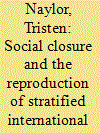

|
|
|
|
|
| Summary/Abstract |
This article investigates how the means by which actors compete for position in the management of international society stratifies international order. Advancing scholarship on hierarchies, it applies a theory of social closure to examine two status groups, The Family of Civilised Nations and the G20, arguing that stratification is reproduced by a dynamic interplay of top-down collectivist exclusion on the part of superiorly positioned actors and bottom-up mimicry performed by those inferiorly positioned. As such, the same means of closure which used the Standard of Civilisation to exclude outsiders from the Family of Civilised Nations in the past stratifies non-state actors today, particularly international non-governmental organisations (INGOs) seeking to play a role in-the G20. This article offers amendments to closure theory in International Relations (IR), demonstrating its utility for analysing contemporary international politics, engaging in trans-historical analysis, and in incorporating non-state actors into enquiry.
|
|
|
|
|
|
|
|
|
|
|
|
|
|
|
|
| 6 |
ID:
184048
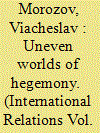

|
|
|
|
|
| Summary/Abstract |
The neo-Marxist literature on uneven and combined development has made significant progress towards a comprehensive theory of the international. Its point of departure is societal multiplicity as a fundamental condition of the international. This article identifies an important lacuna in the ontology of multiplicity: there is no discussion of what constitutes a ‘society’, or the basic entity capable of entering a relationship with other entities. Existing solutions, including those relying on relational sociology, gravitate towards ontological individualism. Building on poststructuralist neo-Gramscian theories, I propose to ground the conceptualisation of ‘society’ in the notion of hegemony. This implies a discursive ontology, which attributes the inside/outside dynamic to hegemonic formations rather than states or societies. Coupled with the understanding of hegemony as a scalar phenomenon, this ontology can account for the primacy of the state in modern times, while also enabling a research focus on other types of collectivities.
|
|
|
|
|
|
|
|
|
|
|
|
|
|
|
|
| 7 |
ID:
184049
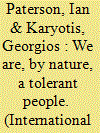

|
|
|
|
|
| Summary/Abstract |
The ‘securitisation’ of migration is argued to rest on a process of framing migrants as a threat to key values, principally identity. Yet, the socially constructed nature of ‘identity’ implies the potential for dual usage: support and contestation of the security frame. Using the UK as an illustrative case, this overlooked dynamic is explored through mixed-methods, incorporating elite political and religious discourse (2005–2015) and original public attitudinal survey evidence. The discourse analysis reveals that the preservation of an imperilled British identity (‘tolerance’) is a frame invoked, in different ways and by different actors, to either support or contest the securitisation of migration. Similarly, British citizens who deeply value the preservation of ‘Britishness’ have diverse, positive and negative views on migration, challenging the notion that identity as a referent object is deterministically linked to anti-immigration attitudes. The innovative concept of ‘counter-securitisation’ is utilised and developed, unpicking these nuances and their implications.
|
|
|
|
|
|
|
|
|
|
|
|
|
|
|
|
|
|
|
|
|